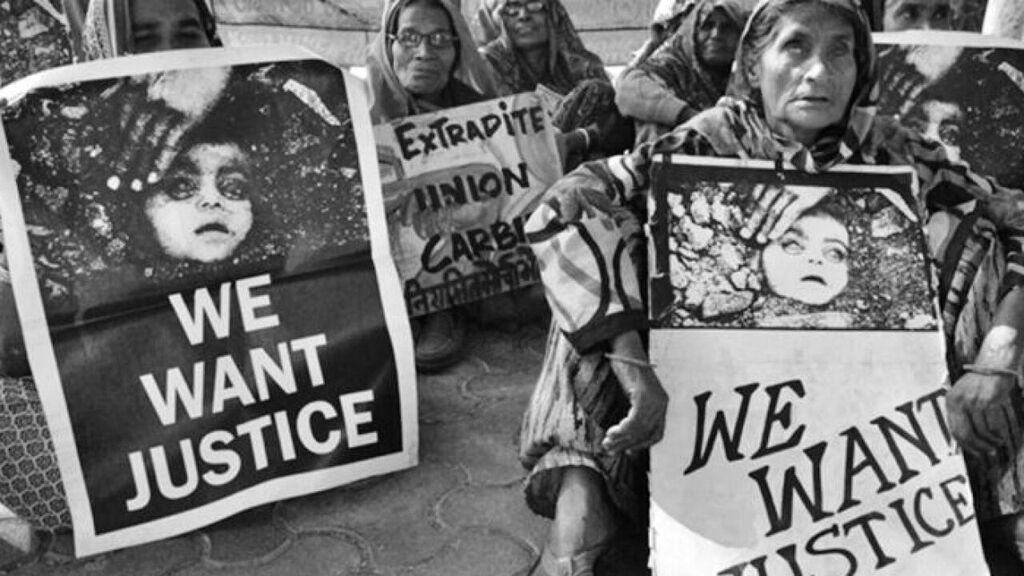In early December 1984, the worst industrial accident in human history took place. An accident that killed nearly 4,000 people within the first few hours, and continued its killing spree in the months and years that followed, causing incalculable casualties, mainly due to the huge increase in infant mortality.
The number of people who went on to live with permanent damage to their health also runs into the tens of thousands, with blindness being one of the most massive side effects. Over 550,000 people were hospitalised after the accident.
The events
In the city of Bhopal in central India, poor residents enthusiastically welcomed the construction of the Union Carbide Corporation (UCC) pesticide plant in the mid-1970s. The new jobs were well paid and acted as bait. The company was to produce the pesticide Sevin, which at that time was being massively used on crops across the country, as well as in other parts of Asia.
The poorest inhabitants of Bhopal lived in slums around the UCC plant. At these facilities, huge quantities of methyl isocyanate (MIC), a chemical that is the raw material for pesticides and is considered one of the most dangerous substances ever used in the chemical industry, were stored. The company was of course aware that this substance had to remain stable at low temperatures not exceeding 4.5 degrees Celsius. Contact of methyl isocyanate with water causes a chemical reaction that dramatically increases its temperature and turns it from liquid to gas.
Within the first few years of the plant’s operation, its owners discovered that the pesticide is not making the “golden” sales they expected. Cutbacks in expenditure began, both in personnel and in the plant’s safety measures. Furthermore, despite the fact that the facility was located in a residential area, there was no evacuation plan in case of an accident, and certainly no information of any kind provided to residents of the risks involved.
On the evening of December 2, 1984, while the people in the slums were sleeping, water entered the tank E610 through a side pipe. A runaway exothermic reaction was caused, in which 30 tonnes of MIC escaped from the tank into the atmosphere during the first hour of the accident. This would increase to 40 tonnes within two hours. An important factor for the devastating consequences of the accident was the problems in maintenance and safety that were neglected by the company.
The leak from the UCC facility spread quickly through the city. Residents in panic, who might have been saved if there had been simple instructions provided to stay indoors and seal every door and window, took to the streets and ran for their lives. The streets were filled with corpses, while the hospitals in the area were in chaos.
Even today, children with birth defects or other serious health problems are still being born in the city and the surrounding areas. Yet, the company responsible for this tragedy with its tens of thousands of victims has paid out only USD 470 million in compensation, despite the fact that the Indian Government was demanding at least USD 3 billion.
India: the multinationals’ guinea pig
But it is not only the story of the Bhopal disaster that proves that the world’s big corporations are playing with the lives and safety of the world’s poorest people. India is actually a living example of this practice in many ways.
In 2002, Monsanto launched a new, genetically modified cotton seed into the Indian market, coupled with its “own pesticide”, which promised to increase production as well as reduce the amounts of fertilizers and pesticides, thus reducing costs for farmers.
Those who were persuaded to use the new seed had to borrow to buy it. And they were forced by the company to buy this seed again and again (since it is “sterile”) and after a few years the need for fertiliser and pesticide increased. Gradually, Indian farmers became totally dependent on Monsanto’s products, which cost them almost 70% of their income! As a result, by 2008, 200,000 people had been driven to suicide due to the despair connected to these debts!
Today
Today, we are still living in a world where corporate profits, especially those of large multinationals, are still prioritised over human life and safety, as well as the environment.
From the immeasurable ecological disaster in the Gulf of Mexico in 2010, caused by an explosion on a BP oil rig, to the crimes of the mining industry worldwide, the profit system continues to threaten the planet and our lives.
Until the world is free from the predators who are siphoning off natural resources and playing with its future, the question is not if, but when and where the next Bhopal disaster will happen.












